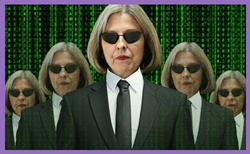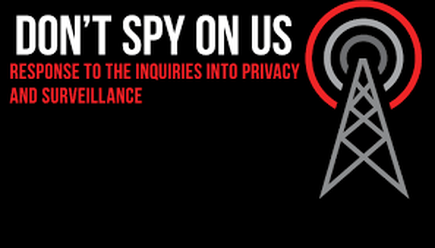 British Home Secretary Theresa May is pushing ahead with her plan to get into law the investigatory power's bill popularly called the snooper's charter and she is doing this in spite of opposition. The Home Office claims that the 'majority' of concerns have been addressed but there is still stiff parliamentary opposition. Tuesday as May gets on with sacrificing what freedoms are left and introducing legislation which will extend powers to police enabling them to hack computers and phones and force Internet service providers and mobile phone companies to maintain records of each user's internet browsing activity the Open Rights goup has issued the following press release: Open Rights Group has responded to the publication of the Investigatory Powers Bill: Executive Director Jim Killock said: “The Home Office is treating the British public with contempt if it thinks it’s acceptable to rush a Bill of this magnitude through Parliament. MPs and peers need sufficient time to consider the fundamental threats to our privacy and security posed by the Investigatory Powers Bill. Many have their minds elsewhere, dealing with important decisions about Europe.” “On first reading, the revised Bill barely pays lip service to the concerns raised by the committees that scrutinised the draft Bill. If passed, it would mean that the UK has one of the most draconian surveillance laws of any democracy with mass surveillance powers to monitor every citizen's browsing history.” Eric King, Director of the Don't Spy on Us coalition, said: “Rather than a full redraft, we've been given cosmetic tweaks to a heavily criticised, deeply intrusive bill.” “Reshuffling safeguards, without meaningfully improving protections, authorisations or oversight does nothing to address widespread concerns about mass surveillance. The unsettling absence of a robust, technical detailed, evaluation of those bulk powers means the case still hasn't been made, and Parliament won't have the information it needs to do it's job.” “There simply isn’t time for proper scrutiny of all these powers in the timeframe proposed. More than 100 experts called on the Home Office to put on the brakes. The government must think again.” Experts call for delay Over 100 people and organisations have signed a public letter calling for the Government to stop rushing the Bill through Parliament. The signatories include MPs, academics, lawyers, human rights activists representatives from the tech industry: Telegraph Report to MPs The Don’t Spy on Us coalition have published a report for MPs, summarising the flaws that experts have identified. About Open Rights Group Open Rights Group is the UK’s leading voice defending freedom of expression, privacy, innovation, creativity and consumer rights on the Internet. Founded in 2005, we have over 3000 paying supporters and a movement of 36,000 activists. Winner of the Liberty Human Rights Campaigner of the Year Award 2012
2 Comments
This would create a “backdoor” to allow access to any encrypted file including personal conversations, medical records, and banking documents.
In the UK, members of the Don't Spy on Us coalition have also written to the Home Secretary to ask for clarification about provisions in the draft Investigatory Powers Bill. The draft Bill, which is being scrutinised by a parliamentary Joint Committee, currently includes provisions that would allow the Secretary of State to impose obligations on companies that would include the “removal of electronic protection.” In their letter, the Don't Spy on Us coalition point out that encryption keeps Internet users around the world safe and secure: “Encryption protects billions of people every day against threats, including criminals trying to steal our phones and laptops, cyber criminals trying to defraud us, or foreign intelligence agencies targeting companies' valuable trade secrets... Weakening the general security and privacy of communications systems erodes protections for everyone, and undermines trust in digital services.” Don't Spy on Us are calling for the UK government to state on the record that they do not intend to undermine digital security. Director of Don't Spy on Us, Eric King said: "Technology companies, civil society groups and academics have all sounded the alarm bell about obscure clauses in this bill that could force companies to weaken the security in technologies we all rely on everyday. The US, the Netherlands, and Finland have all made public statements recognising the public importance of strong encryption in recent months. We want a clear unambiguous statement from the Home Secretary that this bill won’t be used to backdoor encryption, to put peoples concern to rest, once and for all." For further information, contact: Eric King, Director of Don’t Spy on Us: 07986 860 013 Pam Cowburn, Communications Director, Open Rights Group: 07749785932 [The Don't Spy On Us is a coalition of organisations who defend privacy, free expression and digital rights in the UK and in Europe. Its executive includes Article 19, Big Brother Watch, English PEN, Liberty, Privacy International and Open Rights Group. The full letter to Home Secretary Theresa May is published here: https://www.dontspyonus.org.uk/blog/2016/01/11/letter-to-home-secretary-calling/ The letter to world leaders was organised by Access Now and is now open to public support: https://www.SecureTheInternet.org]
Civil liberties groups are concerned about a number of powers in the draft IPB, including: the legalisation of the automated hacking of smartphones for people who may be innocent of any crime; a significant expansion of the ability of the government to intercept the content data of ordinary citizens who are not suspected of any crime and the logging of all web addresses visited by internet users giving GCHQ an picture of the browsing habits of the UK population at large.
One of the Peers on the Committee, Lord Strasburger, who sat on the joint committee on the draft Communications Data Bill and who will sit on the new joint select committee, has criticised the decision to curtail scrutiny of the Bill tweeting: “Ridiculous. Committee scrutinising massive Investigatory Powers Bill given just 2 weeks to hear witnesses. Govt turning it into rubber stamp” There have already been questions about the neutrality of the Joint Committee when it was leaked that its Chair would be Ann Taylor, a former security minister with connections to the defence industry. It has since been announced that Paul Murphy, a former Chair of the Intelligence and Security Committee will now chair the Joint Committee. Members of the Don’t Spy on Us coalition have responded to the decision: Thomas Hughes, Executive Director, Article 19 said: "Rushing the passage of the Investigatory Powers Bill, in order to put snooping powers on a statutory footing, shows contempt for the British public, and for civil liberties. This Bill has huge implications on the security of our communications, and our freedom to express ourselves online. The UK government has a unique opportunity, as well as a duty, to ensure that this Bill is fit for purpose, clear, and transparent, and that people’s rights to free expression and privacy are not unduly restricted in the name of security. Without meaningful consultation and proper scrutiny, no law can have democratic legitimacy." Renate Samson, Chief Executive, Big Brother Watch said: “Repeatedly we have been told that the draft Investigatory Powers Bill will be subject to full scrutiny. The timetable given to the Joint Committee to report on the draft Bill by the 11th February gives little more than 7 weeks for them to consider almost 300 pages of proposals. Yet again, like RIPA and DRIPA before it, legislation which will impact on the security and privacy of the British public is being raced through Parliament at break neck speed.” Eric King, Director, Don’t Spy On Us said: “This timetable is inhospitable to informed consideration of extraordinary powers. It is a fraction of the time previous versions of the Snoopers Charter received, which had just a fraction of the issues to consider. How are the committee to weigh the proportionality of bulk interception powers, the intrusiveness of bulk hacking powers, or scrutinise the evidence base for internet connection records in just a matter of weeks? This is a once in a generation chance to create a world class legal framework. Rushing to hear evidence before Christmas, jeopardises the chance to get it right.” Shami Chakrabarti, Director of Liberty, said: “We all agree new legislation is needed because public discourse and parliamentary scrutiny have lagged behind spying practices in recent years. We welcomed pre-legislative scrutiny of this important and complex Bill. Why undermine this now? Nearly 300 pages in three weeks – is the Home Secretary serious?” Jim Killock, Executive Director, Open Rights Group said: “We’ve been told there should be a ‘mature debate’ but when it comes down to it, the Government seems intent on pushing through one of the most important Bills of this parliament at any cost. This is short sighted and undemocratic.” Sara Nelson, Communications Officer, Privacy International said: “An utter lack of regard for the democratic process and rule of law has been shown by fast-tracking the draft Investigatory Powers Bill through the Parliamentary process. The draft Bill attempts to enshrine in law dramatically wide-ranging surveillance powers of British intelligence agencies and the police, while simultaneously requiring telecommunications and service providers to become complicit in violating British citizens' privacy en masse. Touted as “a gold standard”, the draft Bill sets a deeply concerning precedent by proposing bulk Government hacking, which will be leveraged by foreign governments to replicate similar legislation. The fast-tracking shows a shameful disregard for the need to have an informed debate on the Bill and for MPs to fully understand the implications of all its complex provisions, in order to have an opportunity to meaningfully assess the significant powers of surveillance proposed." [Don't Spy On Us is a coalition of the most influential organisations who defend privacy, free expression and digital rights in the UK and in Europe. Its members include ARTICLE 19, Big Brother Watch, English PEN, Liberty, Open Rights Group and Privacy International. Contact For more information please contact Eric King, Campaign Director, Don’t Spy On Us. [email protected] / 07986 860013] |
Yourvoice
This blog will include a range of reports and opinion pieces covering many issues. It will be YOUR Voice. Archives
April 2017
Categories
All
|



 RSS Feed
RSS Feed
